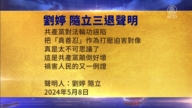【新唐人2014年05月16日讯】“中国华中师范大学中国农村研究院”日前发布的“农村社会和谐指数”显示,目前的中国社会农村和谐指数为59.2526,有学者认为这是“不及格”的意思。还有专家指出,征收农民的土地,是造成农村不和谐的最大原因。
中共官媒13号报导,这是中国首次发表的“农村社会和谐指标”。指数是“华中师范大学”的“中国农村研究院”依托“百村观察”项目,从民主法治、公平正义、诚信友爱、充满活力、安定有序,以及人与自然和谐等方面入手,对反映社会和谐程度的主观指标和客观指标进行分析。
其中,“公平正义”与“民主法治”的指标显示“需要加强”。
北京“东方艾格”咨询公司的农业分析师马文峰,日前接受了《新唐人》的采访,他认为,中国的农民不但没有享受到经济成长的好处,反而受到各种不公平对待,农村建设落后,城乡差距日益扩大,造成农村社会“不和谐”。
北京东方艾格咨询公司农业分析师马文峰:“每年都有中央提出高度重视农业,但真正落实到农业资源转移上相对比较少,几些年中国总的经济发展速度比较快,农村发展的速度相对比较慢,差距一直扩大,城乡有很不公平的地方,农村地区的养老问题,得不到保障,这是一个很不和谐的情况。”
另外,“人与自然和谐相处指标”的目标满分为15,而实际得分约7.6,仅为目标分的一半。在农村生活中,化肥、农药等过多使用,对自然的过度开发,生活消耗过多自然物资,生活垃圾处理的随意性,都影响着人与环境的关系。
马文峰:“农村的土地不能流转,还是靠小规模生产,农业生产效率比较低,农药的使用不规范,这样会造成食品安全问题,环境污染主要来自于工业对农业的污染,还有畜牧业对农业的污染,排泄物直接排到河里的污染,造成环境污染。”
马文峰还指出,造成农村不和谐的最大原因是农民的土地被征收,政府又没有投入发展第二、三产业,失地农民就业得不到保障。
马文峰:“最大的社会矛盾,就是政府和开发商联手征农民的土地,这钱让地方政府拿去了,导致农民失去土地,生活没有保证。有些地方盲目的追求城镇化率,它就拆迁把农民赶上楼,这个不叫城镇化,这是违背客观经济规律的事情。”
报导还说,“安定有序指数”实际得分与目标分数比较,仅次于“诚信友爱”指数,约为68.6%,这表明农村社会相对比较稳定。但农村发展相对缺乏活力。
一位不愿曝光身份的大陆农业专家表示,农村人口外流,剩下老年人耕种,大大降低了农业生产力。
大陆农业专家:“农村现在问题很大,农民队伍断档了,年轻人都进城里打工去了,现在全国到处强拆,土地财政。城市化、城镇化,土地强征了以后,强迫农民住楼房,赔偿几万块钱,要住新楼房几十万,农民根本住不起,也没办法生活, 这个是灾难性的,这个农业潜伏着极大的危机。”
这位大陆农业专家还提到,政府不愿投入农村建设,连小学都撤销了,农村日益凋零的情况令人担忧。
大陆农业专家:“温家宝总理进行了教育改革,把农村的小学都撤销,很多妈妈带着孩子,进城租房子上学,很不方便,给群众带来了严重负担,农村教育基本上放弃了,什么希望小学都破产了。”
旅美中国问题学者谢选骏认为,这份报告给出的“中国农村社会和谐指数”只有59.25,意思就是“不及格”。而他认为,这个数字,还是太高了。
采访编辑/熊斌 后制/舒灿
Harmony Index in Rural China Failed to Pass the Grade
The Centre for Chinese Rural Studies of Central China
Normal University,
recently published its Harmony Index of Chinese
Rural Society,
which demonstrates the current Chinese rural society´s
harmony index is only 59.2526.
Some scholars think that this level fails to pass expectations.
Other experts say, to make impositions upon the land of farmers,
is the worst cause to produce disharmony in rural areas.
According to a Chinese official media report on May 13,
China published its “Harmony Index of Rural Society”
for the first time.
The index highlights the output of “Watch One Hundred
Villages” project,
undertaken by the Centre of Chinese Rural Studies
of Central China Normal University.
The index system is comprised of subjective and objective
indicators in terms of the factors,
including democracy and law, justice and fairness,
integrity and friendliness,
liveability and vitality, stability and orderliness, and the harmony
between human and nature.
Among them, the indicators of justice and fairness and
democracy and law, needs to “enhance and improve”.
NTD recently interviewed agricultural analyst Ma Wenfeng
of Beijing Orient Agribusiness Consultant Company Ltd.
He says, Chinese farmers don´t enjoy the benefits
of the economic growth, on the contrary,
they have been unfairly treated.
The development of rural areas is backwards,
and the gap between city and rural areas is increasing,
which hence contributes to “the disharmony”
of rural society.
Ma Wenfeng: “Every year the Chinese Communist Party´s (CCP)
Central Committee, places emphasis on agriculture.
But the resources invested in the agricultural industry,
is always relatively low.
In recent years, the speed at which the overall economic
development has progressed in China is fast,
yet the speed at which development in rural areas has progressed,
has been relatively slow.
So the gap between the urban and the rural areas,
is on the increase.
There is a side of unfairness between the city and
the countryside.
The pension issue for people in rural areas has still yet
to be secured.
This creates serious disharmony within society.”
The full and expected mark indicator of “harmony between
human and nature” is 15,
but the actual mark is only 7.6, around half of the full mark.
In rural areas, fertilisers and pesticides are overused,
the natural land is over-developed,
the natural products are over-consumed by society,
and the household garbage is disposed of at will.
All of this affects the relationship between the
people and the environment.
Ma Wenfeng: “The land in rural areas is not allowed for trade,
and agriculture still relies on the small-scale operations,
with low producing efficiency and informal pesticide applications.
This is likely to cause the food safety issue.
The environmental pollution comes mainly from industrial
discharge in to rural areas,
with its overspill discharge going directly in to the rivers
thus polluting the environment.”
Ma Wenfeng confirms, the biggest problem of disharmony
in rural areas, is to impose the farmers´ land,
but the local governments are unable to develop the second
and third industries,
which cannot secure the employment of those farmers
without land.
Ma Wenfeng: “The most drastic conflict is when the farmers
land is imposed upon by the governments
and developers jointly.
The land sale revenues are mainly taken away
by the local governments,
which then leads the farmers without land, facing
an insecure living status.
Some places are blindly pursuing high urbanisation rates.
They basically demolish the existing farmers houses
and relocate them to multi-storey residential buildings.
This is not called urbanisation, but a breach of the
objective economic laws.”
The new reports say, “Stability and orderliness indicator,”
has reached a 68.6 percent mark,
and this is second highest mark next to “Integrity and
friendliness indicator”.
This shows the rural society is relatively stable
but the rural development lacks vitality.
One anonymous mainland agricultural expert says,
the outflow of rural population, leaves the aged people
to carry out agriculture production,
largely lowering the agricultural productivity.
Mainland agricultural expert: “Rural areas have serious issues.
Farmer workforces are out of stock because the youth
go out to work in cities.
Currently the forced demolishment of farmers home
is very prevalent.
The local government financial status is predominantly
dependent on selling the land.
Along with the urbanisation, once the farmers´ land is imposed,
farmers are forced to relocate into residential buildings.
The demolished homes are compensated for
with only tens of thousand RMB,
but the new homes inside the residential buildings, cost
hundreds of thousand RMB in rent.
So the farmers cannot afford the expensive new homes
and the new living conditions, this could be disastrous.
There is an extremely huge potential for crisis in rural areas.”
The expert also says, the government are unwilling
to invest in construction in the countryside,
and some primary schools are removed too.
The increasing sluggish situation in rural areas
raises pervasive concerns.
The expert: “Premier Wen Jiabao executed the education reform,
removing many rural primary schools.
Many mothers are with children.
If they have to move to the city, allowing their children
to attend schools, they´ll have to rent a home.
This is very inconvenient and brings about heavy burdens
upon the affected people.
So rural education is almost disregarded,
the so-called Hope primary schools go bankrupt.”
American Chinese issue researcher Mr Xie Xuanjun says,
such a report summarises “the harmony index of Chinese
rural society” is only 59.25, which means failure to pass.
Meanwhile, he also thinks this figure is an
over-estimated figure too.
Interview & Edit/Xong Bin Post-Production/Shu Jie





























